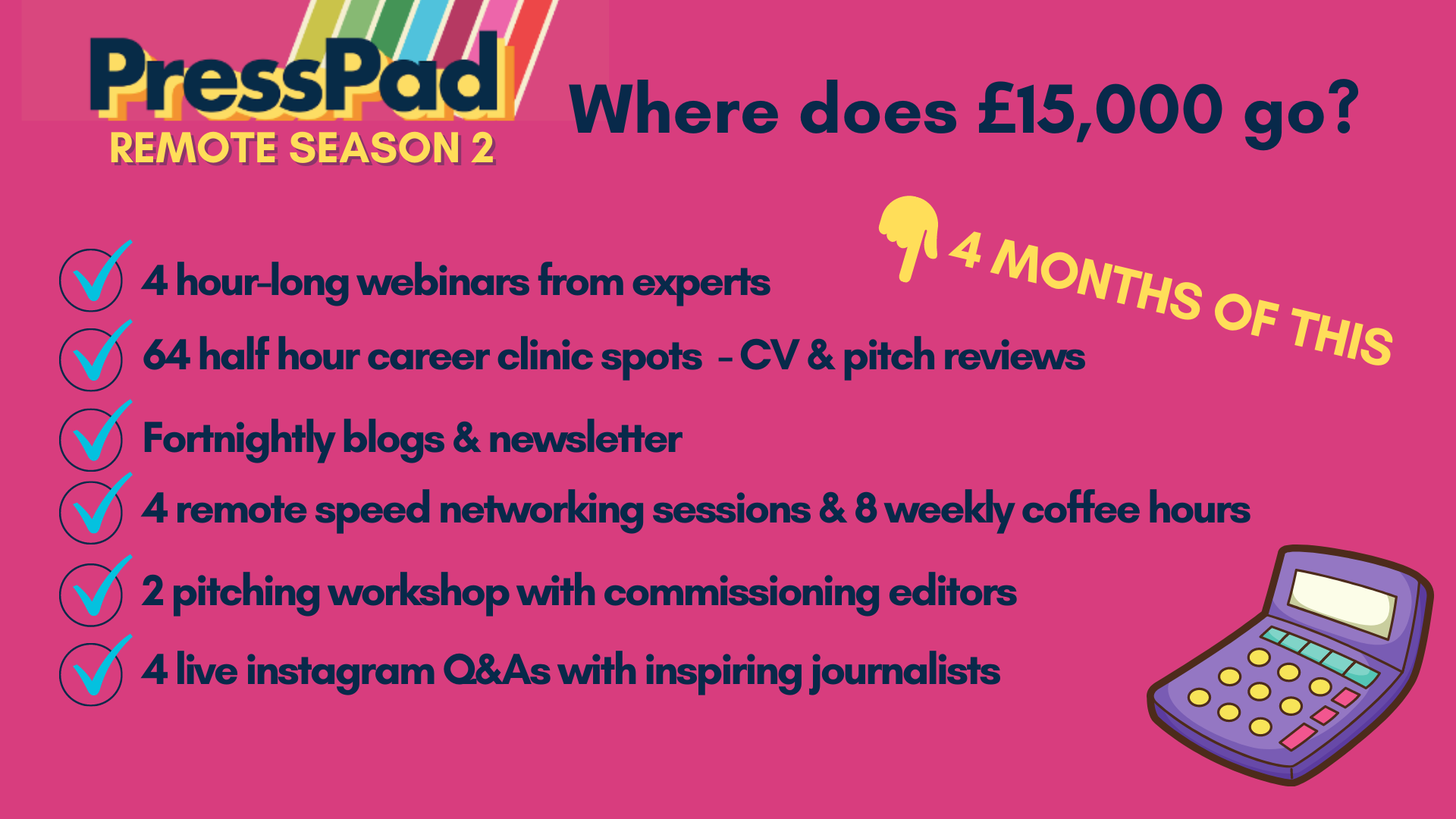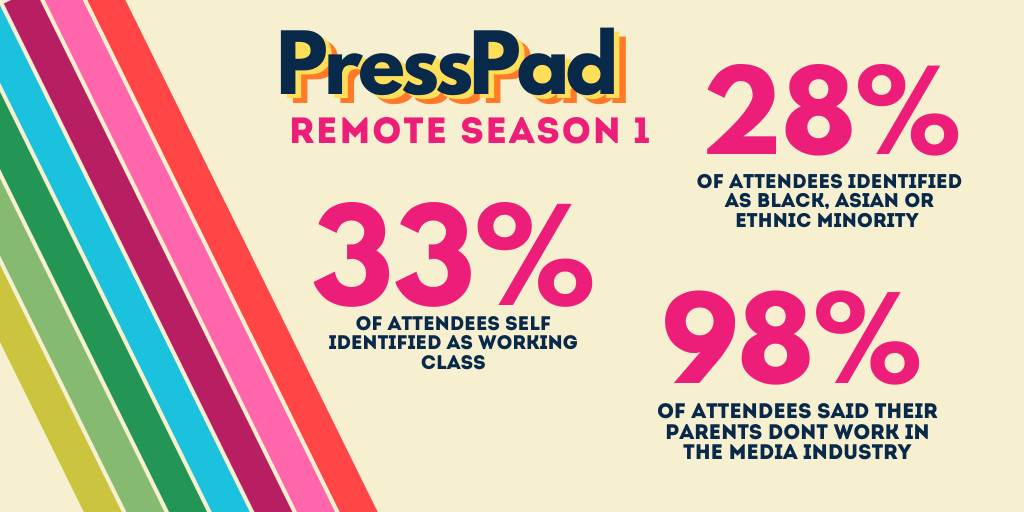PressPad: diversifying media during a pandemic
PressPad's mission to diversify journalism by providing access for young journalists to work opportunities has been knocked back by the pandemic. Here's what they're doing to recover — and how you can help.

A little over a year ago, I wrote about PressPad’s crowdfunding campaign to help develop their service that connects aspiring journalists to mentors and hosts in cities where they’re looking to work, or do work experience. A year on, the organisation is back at the crowdfunding window, and once again I’m going to encourage you to support them.
The reason they’ve had to come back to crowd-funding is, perhaps, not surprising. And yes, it’s the virus. The pandemic put pay to many plans. Ironically, I decided that 2020 was going to be the year that we entertained more as a family — and we’ve ended up spending most of the year not allowed to let non-residents into our house. And that’s the same problem that hit PressPad.
How on earth do you keep a system designed for connecting would-be journalists on work experience with mentors and hosts?
The Pandemic age of PressPad
Clearly, the obvious person to ask is Olivia Crellin, the co-founder of PressPad. Speaking to her on the phone is quite an experience. Her enthusiasm for her subject comes out in fast and voluminous words, and the half hour we have set aside before her next meeting flies by. But then, you wouldn’t give up a huge chunk of your time — and income — to do something like this if you weren’t passionate about it.
And she admits that the initial impulse, back in the spring, was to put the whole system into hibernation, ready to bring it back to life when hosting became possible again. Most of the corporate partnerships they'd agreed vanished or were put on hold, as newsrooms closed their doors to outsiders – and then to their staff.
However, PressPad had won a grant from Nesta as part of the Future News Pilot Fund, and it came with pre-conditions. They had to do something — and thus was launched PressPad Remote, a series of online sessions that gave aspiring journalists the opportunity to learn key skills online, and prepare themselves for the opportunities that will arise once the pandemic recedes.
Here, I detect the first note of caution from Crellin: she’s aware that other people make their living training people, and that setting up free courses would seem to be treading on their toes. As someone who makes a significant proportion of my income from training people, I’m inclined to think she’s worrying unnecessarily, but it’s indicative of a general concern to do no harm to others’ incomes at a precarious time in the industry, while not closing down opportunities for for aspring journalists.
The first season ran between April and July of this year, and PressPad says that it aided “a minimum” of 7,800 people during that period. That’s one reason they’re coming back for more money: so they can do that again, continue helping aspiring journalists, and pay fairly the people running it for their time.
Currently, PressPad is a social enterprise, but not a charity. They are working through the (slow) process of becoming one with the Charity Commission at the moment.
The post-pandemic PressPad
However, with vaccination under way in the UK, they’ve also got an eye on returning to their original mission, and have got a platform to run the mentoring and hosting connections under development. They are working with a firm called Yalla. It’s a fellow social enterprise, based out of London and Berlin, and works with developers in Gaza. They’ve been building out the platform that will connect hosts and mentors with young journalists — and which will handle issues like DBS checks and payment.
“Working with Yalla gets work to people who need it, and gives us a platform for less than we would have paid otherwise,” Crellin says. They explored off-the-shelf platforms, but didn't find what they needed at a price that was sustainable. That word — “sustainable” — comes up a lot in our conversation. The idea of people getting paid fairly is evidently important to her. She alludes to it many times, and with an edge that might be borne of a bad experience after the last crowdfunder, when a colleague took to Twitter to criticise the way PressPad was operating.
“Look, everyone has a right to voice concern,” says Crellin. “But good luck doing this for free sustainably. And it needs to be sustainable, so we can carry on providing opportunities.”
The multi-tier model
The need to charge people for accommodation is important, as the organisation explained in a press release back in January. The organisation needs to continue to fund itself, while offering bursaries, so that people who can’t afford to pay for the accommodation can still access working opportunities.
But Crellin hopes that companies will also help fund the accommodation for trainees or people on placements. “Diversity needs to be a real line in companies' budgets, not just something they do for charity or PR,” she says. Any profits the enterprise makes will go into a bursary pot that will allow those who really can’t afford to access the service to be supported through placements.
Crellin also notes that the £20 to £30 per night they aim for on the accommodation fees is well below what people could access any other way, safely, given the background checks that PressPad runs on hosts, and the mentoring that comes with it. It’s not purely an accommodation offer, it’s an accommodation and mentoring offer. It allows people from affluent middle-class backgrounds outside London to access these opportunities affordably, while helping support a system that will aid people from lower income backgrounds, too.
Diversifying media is a work in progress
Journalists are a prickly, competitive and often hyper-critical bunch, so it’s no wonder that Crellin occasionally slows down, and picks her way around the interview pitfalls that she sense I’m leading her towards. And she’s right to. If you’re asking people to put their hands in their pockets, you have to be really clear about what they’re doing so to support. That’s a lesson well learnt.
Crellin and the team have clarified the offer considerably, and sharpened up the messaging to prevent a recurrence of the problems earlier in the year. For example, this is where the crowdfunding money is going:

And the time since has made it obvious that these sorts of schemes are needed. A summer of racial discontent in the US has spilled over internationally, and has made plain how much work is still to be done in addressing diversity in newsrooms.
On a personal level, the more diverse the newsroom — or group of students — I work with, the more interesting and challenging their journalism is. Journalism is always at its best when it comes from a broad range of perspectives and experiences, rather than a narrow range of them. And that’s why I think that the tightrope Crellin and the team are walking, on providing opportunities sustainably, while treating everyone involved fairly, is worth supporting. 28% of the people who attended the last round of PressPad remote identified as BAME.

They're reaching the right people. They just need help to carry on doing so.
You can back the crowdfunder here. The deadline is early on the morning of the 16th December, UK time — so, knowing journalists, treat it as the evening of the 15th.





